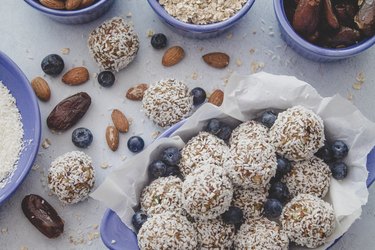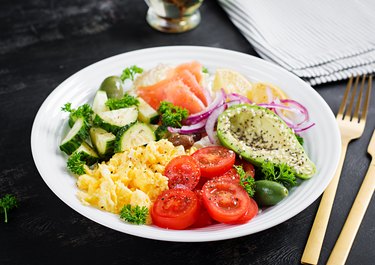
You start the day with a little pep in your step, but by the time the afternoon rolls around, you're completely pooped. When the dreaded midday slump strikes, it can make you super sluggish.
Breakfast plays a pivotal role in whether you feel energized or exhausted later in the day. And if you're not eating the right foods to fuel you, you'll likely crash hard.
Video of the Day
Video of the Day
Here, dietitian May Zhu, RDN, LDN, founder of Nutrition Happens, explains why lethargy can hit around lunchtime, plus which breakfast foods to avoid to stave off the midday slump — and which will lift your energy levels all morning long.
First, What Causes the Midday Slump?
Many factors, including stress and dehydration, can cause energy dips throughout the day, Zhu says. But what you put on your plate in the a.m. is an important piece of the puzzle.
"Nutrition-wise, not eating enough or eating the wrong combination of foods can also contribute to a midday crash," Zhu says.
"Typically, your body will digest simple carbohydrates (without any protein or fiber) faster than fiber-rich carbohydrates (with protein), which leads to a quick spike and subsequent dip in your energy levels," she explains.
Put another way, foods that digest quickly are not the key to a continuous stream of energy.
5 Breakfast Foods That Make You Feel Tired
If you want sustained energy into lunchtime, limit the following fast-digesting foods during your morning meal.
1. Sweet Pastries
Munching on a muffin or doughnut for breakfast is a surefire way to bring on a midday energy dip.
"While fine every once in a while, pastries without the extra fiber and protein can contribute to a midday slump," Zhu says. The refined carbohydrates in the form of sugar may provide a quick energy boost, but they don't help you stay full or energized for long, she explains.
2. Energy Drinks
OK, this one is ironic: Energy drinks are supposed to supply you with extra oomph, but in reality, they can lead to lethargy later in the day. That's especially true for varieties with high amounts of added sugar, Zhu says.
"Typically, energy drinks provide a short-term boost of energy through caffeine, but without slow digesting foods like fiber-rich carbs and protein, the energy crash will follow shortly," she says.
3. Fruit Juice
If you enjoy a tall glass of OJ first thing in the morning, you may want to rethink that choice to temper the tiredness that turns up midday.
"Fruit juice by itself isn't bad by any means — 100 percent fruit juice does contain vitamins and minerals — but it's also been stripped of the fiber that's typically found in whole fruits," Zhu says.
Here's why that matters: Without fiber, the sugar in the juice gets absorbed fast, leading to a sharp surge in energy, Zhu says. But what goes up must come down, so you'll likely experience a fast fall in energy levels too, which can contribute to the midday slump.
"Therefore, drinking juice alone for breakfast may not be the best option for providing long-lasting energy," Zhu says. Instead, incorporate a glass of juice as a part of a balanced meal with additional protein, fiber and healthy fats, she says.
4. High-Sugar, Low-Fiber Cereal
Some cereals can be just as sugary as a piece of pastry. And this type of breakfast doesn't bode well for enduring energy.
"Cereal that's low in fiber and high in added sugars can cause your blood sugar to increase and then quickly drop, which can result in the mid-morning/afternoon slump," Zhu says.
Aim for a cereal with at least 5 grams of fiber per serving (and fewer than 8 grams of added sugar). You can also "try pairing it with chia seeds or fruit for extra fiber or adding in almonds and milk for extra protein and fats for satiety," Zhu says.
5. Low-Fiber White Bread
If toast is your go-to brekkie, be sure that it's not white bread.
"Lower-fiber, refined carbohydrates [like white bread] can contribute to energy slumps, especially if they're not combined with other sources of fiber or protein," Zhu says.
Once again, this is because refined carbs contain less fiber, a nutrient that keeps your blood sugar stable and your belly full.
"Whole-grain carbohydrate options [such as whole-wheat bread] will generally provide more fiber than their refined counterparts — and we know that fiber-rich options can help slow down the digestion process and delay stomach emptying, leading to feelings of satiety and fullness," Zhu says.
How a Nutritious Breakfast Can Help Prevent the Midday Slump
Having a substantial meal at breakfast time can enhance energy throughout the day, Zhu says. So what does an energizing a.m. meal look like?
A combination of fiber-rich carbs, protein and healthy fats, Zhu says.
Complex carbohydrates that contain fiber (such as whole grains, legumes and fruit) introduce sugar (i.e., energy) into the bloodstream at a much slower rate, Zhu says. Meanwhile, the body takes an even longer time to digest protein and healthy fats, she adds.
That's why this terrific trio at breakfast results in a steadier source of sustained energy throughout the day.
4 Breakfast Combos for Long-Lasting Energy
To steer clear of the midday slump, try these balanced breakfast options. Each supplies a satisfying blend of protein, fiber and healthy fats to slow down digestion and keep your gas tank full of fuel until lunch, Zhu says.
1. Scrambled or Hard-Boiled Eggs With Fruit or Whole-Grain Toast
"One egg provides 6 grams of quality protein to fill you up and help you feel more satiated," Zhu says. "Combining it with fruit or whole-grain toast that contains fiber will help provide you with a steady stream of energy all morning."
2. Greek Yogurt or Cottage Cheese With Fruit
"Greek yogurt and cottage cheese both provide an ample amount of protein," Zhu says. And, as we know, the fiber in fruit is fantastic for decelerating the rate of digestion.
Try going for low-fat yogurt or cottage cheese instead of fat-free varieties to add healthy fats to your breakfast.
3. Oatmeal With Nut Butter
"Oatmeal contains a type of soluble fiber called beta-glucan that may help increase the feeling of fullness," Zhu says. That's because beta-glucan "forms a thick gel that slows down stomach emptying and the absorption of glucose in the blood," she explains.
In other words, oats digest slower and may help lower blood sugar levels.
"Pairing oats with nut butter can provide an extra dose of healthy fats to help further satiety and energy," Zhu says.
4. Omelet With Vegetables
Again, eggs are an eggcellent, protein-rich way to start the day. "Omelets in particular are a great canvas to add in extra vegetables for additional fiber and nutrients," Zhu says.


